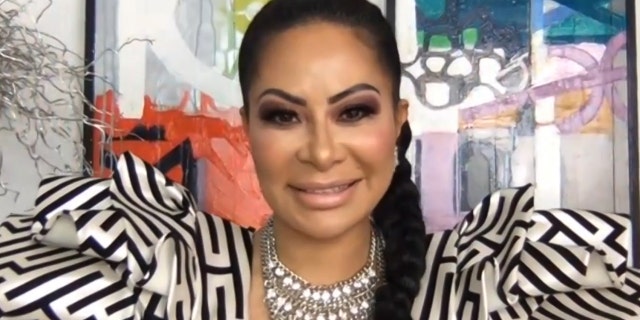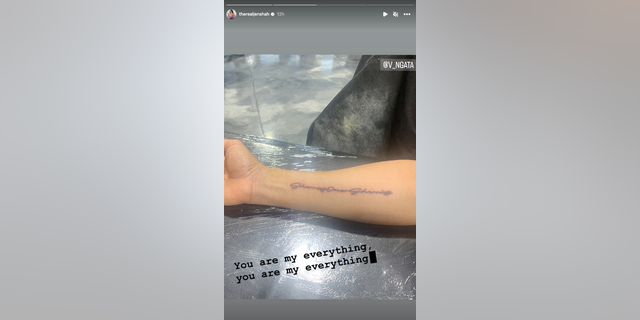Jen Shah reported to a Texas federal prison Friday to begin serving her 6 ½ year sentence for participating in a nationwide telemarketing scheme.
“Jennifer Shah has arrived at the Federal Prison Camp Bryan in Bryan, Texas, and is in the custody of the Bureau of Prisons,” a spokesperson for the Federal Bureau of Prisons confirmed to Fox News Digital.
“For privacy, safety, and security reasons, we do not release information on the conditions of confinement for any inmate or group of inmates,” the spokesperson added.
The “Real Housewives of Salt Lake City” star pled guilty last year to one count of conspiracy to commit wire fraud. She originally faced up to 50 years behind bars.
Federal Prison Camp Bryan (FPC Bryan), a minimum-security camp for female inmates located roughly 90 miles northwest of Houston in Bryan, Texas, has a total of 559 inmates.
Shah won’t be the only famous face at the prison, though, when Theranos founder Elizabeth Holmes begins her 11-year sentence at the 37-acre facility in April. Holmes was convicted of defrauding investors who funded her fake blood-testing company.
JEN SHAH GETS NEW TATTOO BEFORE HEADING TO PRISON FOR TELEMARKETING FRAUD SCAM
‘Real Housewives of Salt Lake City’ star Jen Shah reported to prison Friday to begin serving her 6.5 year sentence. (Getty Images)
Before Jen checked into her new residence, she made sure to keep her family physically close with a tattoo of her loved one’s names etched across her arm.
The song “Everything” by R&B singer Mary J. Blige played in the background of her post as she showed off new ink of “Sharrieff, Omar, Sharrieff” written in cursive script on her forearm.
JEN SHAH SENTENCED TO 78 MONTHS IN PRISON FOR HER ROLE IN NATIONWIDE TELEMARKETING FRAUD SCAM
Shah is married to University of Utah assistant football coach Sharrieff Shah, and the couple share two sons together – Omar and Sharrieff Jr.
In a statement to Fox News Digital on Thursday, Shah’s lawyer Priya Chaudhry said: “Jen Shah’s resolve to make her victims whole and to turn her life around is unyielding. She is committed to serving her sentence with courage and purpose, fueled by her desire to make amends for the hurt she has caused and to help others in her new community.
“No obstacle will deter Jen from making the most of her time in prison, and she’s determined to make restitution to those whose lives she has impacted.
“Her path ahead will be filled with challenges, but with the unwavering love and support of her family and friends, Jen is prepared to face these challenges head-on and emerge from this experience a better person who makes a positive impact on others,” the statement concluded.

Jen Shah said she was “in denial” that she had done anything wrong. (Bravo/NBCU Photo Bank)
In an interview with White Collar Advice, Shah, herself, discussed her crimes and her sentence, saying: “My immediate response was, ‘They must have the wrong person. They must have this all wrong. I didn’t do anything.’ … I was in complete denial at that time, for a long time, throughout the process, because I truly believed, and was telling myself I’m not guilty of these things that they’re accusing me of. That’s what I thought when the investigation and the arrest first started.'”
She said that she was so in denial because, “At the time, I thought I was working very openly with my lawyers and conveying all of the facts as I recall them and what my involvement was, but then when I fast-forward it was like I was in this tunnel, right, and I was only seeing what I wanted to see and what I wanted to recall, and what I thought, because again, my perception was ‘I didn’t do this.’”
According to Shah, it wasn’t until a year later that she realized that she did in fact do something wrong.
“I realized that, you know what, I made a mistake and my mistakes hurt people,” she said. “My mistakes created victims, people were hurt from this. My role in this hurt a lot of people, and that was really hard for me to finally accept. I was lying to myself, because I didn’t want to accept that I had done these things or that I had hurt anybody or created victims, or my actions caused harm to people.

Jen Shah brought two very important items with her when she surrendered herself. (AP Photo/Rick Bowme)
“I did not want to accept that at all, and I was lying to myself and telling myself what I wanted to hear, because you never expect that you’re going to be in this position that you are going to be somebody that is involved in a government investigation and facing prison. The reality of going to prison, I didn’t want that to be my reality. That wasn’t supposed to be my reality and that thinking fostered more bad decisions for me throughout the legal process.”
Throughout the entire process, she said she had an extremely difficult time understanding why she was charged, and that “It wasn’t until right before trial where I’m looking at evidence that is now coming over and meeting with my attorneys, and they’re like ‘Wait a minute,’ and I’m questioning it going, ‘Hold on a second, I don’t recall, I don’t remember this. I don’t remember these specifics.’
“The biggest thing for me was seeing an actual list of victim names. That was the first time I had seen that. It became a reality for me at that point, that there were actual people hurt from this, because prior to that, I had never seen that … Not until I saw the actual victim list and realized, you know what, my actions and my decisions, I made bad decisions.”
As for her time in prison, she said she was only going to bring two things inside with her: “the Quran and my release plan.”

Jen had her family’s names inked on her right forearm ahead of prison stint. The song ‘Everything’ by R&B singer Mary J. Blige played in the background. (Instagram )
The release plan is “an 18-page release plan that has 11 different sections that is going to help me stay on track, hold me accountable … I’m going to be journaling the experience, documenting everything. This release plan, is not only my roadmap, but it’s what is going to hold me accountable for everything that I told the judge in sentencing, that I make sure that I make these victims whole.
“This release plan is going to help me be successful so that I can do that, so that I can prove worthy to my family of all the love and support they’ve showed me throughout this entire process … It’s going to help me be as productive as possible, and make the most of the situation, because I can’t change this situation, I am surrendering to prison, but what I can control and what I can change and have control over is what I make of this.”
Jen was sentenced in January to 78 months in prison, followed by five years of supervised release. She was arrested while Bravo cameras were rolling in March 2021, and professed her innocence in the nationwide scam which targeted the elderly, only to change her plea last year.
Once Shah completes intake procedures, which includes a medical and social screening, she’ll be assigned a housing unit and will develop an individual plan with “education and psychology staff” to work toward “reentry into the community,” according to FPC Bryan’s handbook.

Jen Shah was sentenced in January to 78 months in prison. The ‘RHOSLC’ star left a Manhattan court wearing a light brown ensemble. (Gotham)
General wake-up for all inmates is 6 a.m., and “late sleepers who are unable to maintain rooms or arrive at work on time are subject to disciplinary action.” Lights go out at 10:30 p.m. except on weekends or federal holidays when inmates receive an extra hour.
She’ll forego her luxurious life of designer labels in lieu of “pastel green, gray, and/or white” government clothing, which will be labeled with her name and registration number. Shah will also be issued individual washcloths and towels.
Breakfast begins promptly at 6:30 a.m. with lunch at 10:30 a.m. and dinner at 4:30 p.m.
Jewelry is limited to plain wedding bands, chain without stones and “appropriate religious medallion” which can be worn on the inside of the shirt. The total value may not exceed $100.
Similarly, Jen is allowed to have authorized footwear for work, showering and “athletic/specialty” with a maximum value of $100. Shoes will be “placed neatly under the bed.”

“Real Housewives of Salt Lake City” star Jen Shah entered a guilty plea in July to “put this ordeal behind her,” according to her lawyer (Chad Kirkland/Bravo)
“Study, game, and laundry rooms and television operating hours” are between 6 a.m. to 9:30 p.m. except for weekends and holidays.
Visiting hours are available throughout the weekend. Shah will have access to “video visiting,” a 25-minute online session which “encourages visiting by family, friends, and community groups to maintain the morale of the inmate and to develop closer relationships between the inmate and family members or others in the community.”
Shah and her longtime assistant, Stuart Smith, were “each charged with one count of conspiracy to commit wire fraud in connection with telemarketing through which they victimized 10 or more persons over the age of 55, which carries a maximum sentence of 30 years, and one count of conspiracy to commit money laundering, which carries a maximum sentence of 20 years,” the Department of Justice said in a release published at the time of their arrests.
CLICK HERE TO SIGN UP FOR THE ENTERTAINMENT NEWSLETTER
The 49-year-old reality star initially pled not guilty in 2021, but entered a guilty plea one year later as part of an agreement in which the money laundering charge was dropped. She agreed to forfeit $6.5 million and also pay restitution up to $9.5 million.

Shah professed her innocence during the “RHOSLC” season two reunion. (Heidi Gutman)
Shah and Smith allegedly used third-party names for their business entities, according to the initial indictment. The pair allegedly told victims to use encrypted messages as forms of communication and instructed users to send payments to offshore accounts.
The case was investigated by Homeland Security Investigations (HSI) New York’s El Dorado Task Force with support from HSI Salt Lake.
“Shah’s fraud scheme targeted and exploited vulnerable, often elderly, working-class people. She and her co-conspirators built their publicly lavish lifestyles on the false promises of financial independence offered to their victims – victims who to them, were merely ‘leads’ to be bought and sold,” said Ivan J. Arvelo, Special Agent in Charge for Homeland Security Investigations in New York.
“Shah’s crimes have had deep, lasting impacts on the lives of her victims and today’s significant sentence and forfeiture reflects the seriousness of her crimes,” Arvelo continued. “HSI, along with our partners at the New York City Police Department & the United States Attorney’s Office for the Southern District of New York, remains committed to using our expertise in financial investigations to investigate and prosecute those who prey on the most vulnerable members of our society.”
CLICK HERE TO GET THE FOX NEWS APP